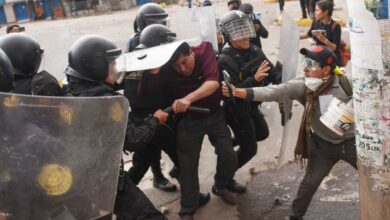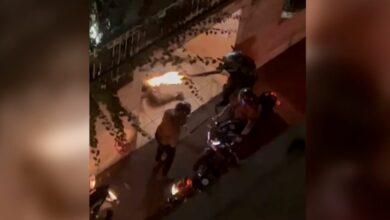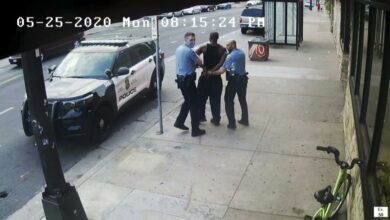Last Friday, police captured a man they called "Cairo's most dangerous criminal." The Egyptian media jumped at the opportunity to turn this revelation into front page news, but before they could go any further, Khanoufa, the man in question, died in custody just two days after his capture. Police have called his death a suicide.
It just so happens that I met Khanoufa on numerous occasions – he lives in an area of Cairo I visit frequently – and eventually became friends with him.
I was caught off-guard by the popular representation of this man, spearheaded by local media, which was tainted by outright exaggerations of who he was, where he was from and what he did. Somewhere behind the grandiose statements about Cairo’s most wanted thug lie the fragments of a human life that evaded the media attention that followed him everywhere he went.
The first time I met Khanoufa – his real name was Refaat Abdel Shakour Hassan and he was 33 years old – was oddly enough at his wedding, three months after he was let out of Wadi al-Natrun Prison on 28 January. Khanoufa was released with thousands of other prisoners during the Interior Ministry's apparently orchestrated prison clearances to spread chaos in a desperate attempt to silence the revolution.
I had heard of Khanoufa beforehand from friends in Ezbet Abu Qarn, his next-door neighbors, and his best friends from childhood. They told me that he spent half of his life in prison; he sold drugs, but refused to pay off the police or be a street dealer; he refused to coordinate with bigger, more corrupt drug dealers; he never stole from people.
I believed them, but their descriptions alone could not adequately explain the dynamic enigma that was Khanoufa.
First meeting
On Khanoufa's wedding day, I was already visiting my friend Khaled in Ezbet Abu Qarn, so I tagged along for the wedding. Upon arriving at Khanoufa's home, we were greeted by a slim man, no taller than 5 feet, 10 inches. Dressed in an ironed, white buttoned-down shirt and black dress pants, Khanoufa was hardly the colossus I had envisioned. The only giveaway of the life Khanoufa had led was on his face. A scar cut through his left cheekbone and his eyes were set deep into an angular face, betraying a mixture of melancholic despair and jittery alertness.
“You’re very welcome, Mr. Mohamed! Thanks for coming,” he said almost bashfully in a slightly nasal voice – the reason behind his nickname. He then played the role of the attentive host, making sure we were appropriately seated and waited on while the rest of his 200 or so guests partied the night away around us.
It turned out that Khanoufa had not only decided to get married in the midst of a police-led campaign to catch him as one of their most wanted fugitives, but had also chosen to have an audacious wedding out in the open, in the middle of his neighborhood.
Less than a week before, residents in Ezbet Abu Qarn were telling tales of yet another Khanoufa escape from a planned police ambush to capture him. “I saw everything! He was running from rooftop to rooftop while the entire police force was trying to catch him. But they couldn’t,” said 13-year-old Hanan, one of Khanoufa’s neighbors.
Another story was relayed by Gameel, Khanoufa's brother, who talked about how the police took Khanoufa in and beat him up, in addition to harassing his three sisters once he got away.
At the wedding, every single acquaintance I made in Ezbet Abu Qarn would say something to the effect of, “Did you hear about how Khanoufa escaped the military police the other day?”
Being an outlaw
While some in his neighborhood, even those in his family, acknowledge that Khanoufa was a criminal, they continue to stand behind his reputation on the belief that he was a victim of the system he was born into.
“He turned out how he did because the police left him no other path in life,” Khaled, one of Khanoufa's neighbors, said.
At the age of 14, after participating in a neighborhood brawl, Khanoufa spent the first of a series of six-month stints in juvenile hall for youth misdemeanors. He became “marked” by police as someone they could pin crimes on or extort for money with the threat of imprisonment.
When his father, Abdel Shakour, passed away, Khanoufa's family could no longer afford to pay-off the police, and he began spending more and more desperate nights in prison.
“That is when he turned to a life of crime. When he realized that he would be treated as a criminal for the rest of his life, no matter what. He reached a level of despair and said, 'They’d take me in and put me in prison, regardless,’” Khaled said.
He ended up spending half of his life in prison, from his teenage years until his death. This included one seven-year stint in jail for a cornucopia of drug trafficking charges. Three months after getting out from that term, Khanoufa was arrested again and given a ten-year sentence for trafficking heroin, carrying a loaded weapon, and firing at a police officer.
“All I had on me was one stick of hashish, and a knife, and that’s what was in the initial police report,” Khanoufa said of those charges at the time. But miraculously, nine months into his ten-year sentence, on 28 January 2011, Khanoufa's cell door opened and he simply walked out to what he perceived to be his newfound freedom.
“I prayed to God that he would save me from the injustice that happened to me, and God responded. I didn’t escape, and anyone who says I escaped doesn’t understand divine justice,” Khanoufa said.
Like many people in his line of work, Khanoufa tried to justify his actions and constantly reassured himself and others that he was not a bad guy. He said that he didn’t deal with hard drugs and looked after his family. And he also said he refused to be a drug peddler for the police or larger, oppressive drug dealers.
Whenever I sauntered into Ezbet Abu Qarn, Khanoufa did what any good host would do: take me out for food and pay for the tea. If there were one seat available, he’d always make sure I sat in it, while he himself was fine sitting on a box or Coke-bottle crate.
Khanoufa’s last days
The last two months of Khanoufa’s life were tumultuous, as police conducted three full-on, unsuccessful raids in Ezbet Abu Qarn to try and arrest the fugitive, Khanoufa.
After the second raid, authorities took his mother and sisters into the Manial police station to try and pressure them into giving him up. Khanoufa responded by rounding up his friends and rioting in front of the station. A 12-year-old boy was shot dead in the melee, with a few eyewitnesses accusing a police officer of shooting the boy.
I met Khanoufa in the aftermath.
“I don’t get why they’re dragging my mother and sisters into this! They are as honest and good as anyone can be! Of course, I’ll take my revenge on the police,” he said. He was incensed, but still seemed composed and self-assured.
Residents of Ezbet Abu Qarn, however, began sensing that things wouldn’t end well for Khanoufa this time. Khanoufa had never talked to me specifically about his business and what circles he was into. His friends, however, said that some corrupt police officers and drug dealers had given up on trying to incorporate Khanoufa into their racket, and were afraid that his “nothing-to-lose” attitude was turning into a real threat.
That same day, I hitched a ride on the back of a pick-up truck to leave Ezbet Abu Qarn. On the way out, I saw Khanoufa for the last time, hand-in-hand with his wife.
“Khanoufa! Thanks for the tea," I yelled out. He waved back and said, “You’re always welcome.” It was, I think, the only time I ever saw him smile.
Khanoufa barely escaped the third raid, when police officers entered the neighborhood in plainclothes. They completely destroyed his mother’s house, breaking furniture and turning the place upside-down.
Khanoufa at that point lost it, and went with his friends to cut off the nearby Salah Salem highway. In the confusion, a young 15-year-old boy was killed on his way back from work on the donkey cart he used to collect and sell scrap garbage.
Eyewitnesses identified the shooter as the same police officer who had killed the 12-year-old boy in the riots outside the Manial police station. Khanoufa’s friends had to restrain him his plans to set fire to government buildings, churches and mosques.
Ezbet Abu Qarn residents claim that Khanoufa was finally caught by undercover cops pretending to be drug dealers in their neighborhood.
Along with charging him with evading justice and escaping prison, police blamed Khanoufa for the deaths of the two boys. Khanoufa was now facing life in prison, rather than the nine years remaining on his ten-year sentence.
Khanoufa's supporters
“How is Khanoufa Cairo’s most dangerous criminal? He did do some crimes that he needs to pay for, but he’s not the most dangerous thug,” said Omar, who lives in Ezbet Abu Qarn.
To the people of his neighborhood, the media portrayed Khanoufa's arrest inaccurately. Most papers ran headlines like: “Egypt’s police force caught Cairo’s most dangerous thug among ululation and cheers of ‘God is Great!’”
“How can they say that the entire neighborhood cheered when they caught him? They had to catch him outside of the area, because they know we would’ve helped him escape,” Omar added.
That much I believe. Call it local solidarity, kinship or friendship; despite their differences with Khanoufa’s chosen path in life, the people in his area liked him, and he liked them back. I remember that at Khanoufa's wedding, Gamal, a neighborhood dweller, whispered to me, “You know half the men here are ready [armed] in case the government [police] decide to raid the wedding; we’ll never stand for that.”
“Here, I am among my family and my people, I am safe,” he said, when I once asked him why he was not hiding from the police. In fact, more than once I saw him walking down the street arm-in-arm with his wife, who was two months pregnant with his child when Khanoufa died in prison.
The media went to great lengths portray Khanoufa as the prototype of the tyrannical thug, demanding kickbacks from area folk and extorting others along with running drugs. But in fact, after meticulous attempts to find out Khanoufa’s partners in crime, I found that he generally worked alone.
The Ezbat Abu Qarn Brand
Ezbet Abu Qarn residents are born with the chips heavily stacked against them, victims of a government content with convincing itself – and others – that the ills of Cairene society and their attendant criminal activities are concentrated in these impoverished enclaves.
Dozens of Ezbet Abu Qarn residents told me how for many in the area, police persecution and being branded as a thug is a fact of life, and even more so for “marked” individuals.
“When policemen stop us, and see Ezbet Abu Qarn as the place of residence, that’s like a crime in and of itself,” said 25-year-old vegetable salesman Adham.
Any discussion about the state of Ezbet Abu Qarn’s residents must include their complaints about being shackled by a system that predetermines their own inadequacy. “Because of one or two hundred drug dealers or thugs, the government treats us all like hardened criminals,” said sandwich seller Hany.
One thing all Ezbet Abu Qarn residents agree on is that the “real” drug dealers – the ones that make up to LE50,000 a day – are in cahoots with police and have never had to face the law.
One day, I walked around asking residents who the biggest drug dealers were, and every single resident named the same two individuals. “They’re untouchable, because they pay the police. One of them told me point-blank one day that he pays around LE100,000 a week to police,” said Adel, who owns a small recycling factory.
“If you pay the police, you escape prison – being innocent or not has nothing to do with it,” is a mantra oft-repeated by Abu Qarn residents. Thus, Khanoufa’s constant imprisonment was not always treated with the same social derision to an Ezbet Abu Qarn resident as it would for someone from Maadi, a high-end suburb.
I witnessed the perils of this Ezbet Abu Qarn brand first-hand one day, when I accompanied Khaled on a trip to enroll his daughter Sanaa in a different high school so she could be closer to her friends. Sanaa had above average grades, so much that the director at the potential school immediately and gleefully sang her praises. “Good for you! Of course we’d accept you with these grades,” he glowed.
When Khaled handed over his ID to finalize the transfer, the glee on the inspector’s face immediately turned to gloom. “Oh shit! Why didn’t you tell me you’re from Ezbet Abu Qarn? This is an issue." (This discussion was roughly translated.)
For someone like Khanoufa, with a checkered juvenile history, the odds against overcoming this type of situation were all but insurmountable.
“The way Khanoufa turned out could’ve happened to any of us,” Khaled said.
The end of an seemingly endless saga
The media lauded the police when they captured the man authorities deemed to be Cairo’s most wanted man and most dangerous criminal. They also had no problem perpetuating the myth of Ezbet Abu Qarn as a drug dealer’s haven and generally a place for bad people to congregate.
Then when Khanoufa died, without a second thought the media reported his death as a suicide, as if it were an automatic reaction from someone facing a long prison sentence. They never questioned how a man who had already spent such a large portion of his life in prison would all of the sudden kill himself two days into his confinement, before his trial and with the knowledge that his new bride was two months pregnant.
None of Khanoufa’s neighbors think he committed suicide, and all of them believe that he had enough evidence to incriminate a host of corrupt police officers.
Khanoufa's life and death raise an array of unresolved issues, from the hypocrisies of the “rule of law," to the failures of media coverage, to the popular misconceptions of urban poverty and slum life. And while he was surely no saint, he was also not the same man as the media portrayed him as, alongside headlines screaming, “The most dangerous thug in Cairo.”




